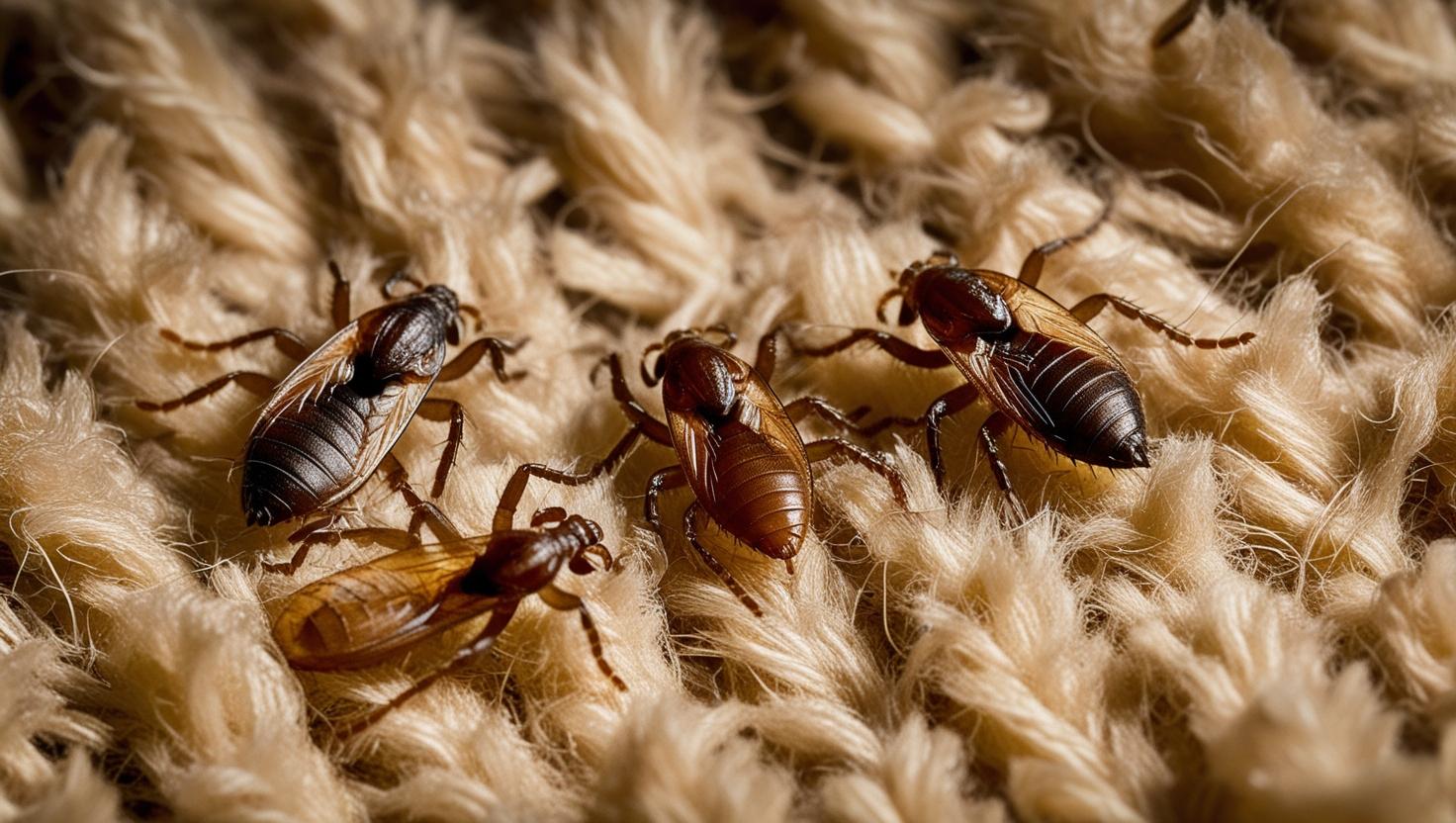Introduction
Fleas are tiny pests that can create big problems, especially for households with pets. They survive by feeding on the blood of mammals, primarily cats, dogs, and other furry animals. Once they enter a home, fleas can quickly settle into the carpets, where they find the perfect environment to thrive. But what happens when fleas lose their host? Let’s dive into the details of flea survival and how long they can live in carpet without a host.
What Are Fleas and Why Are They Problematic?
Fleas are small, wingless insects with strong legs that allow them to jump from one host to another. These pests are notorious for their rapid reproduction, with a single flea laying up to 50 eggs per day. Fleas survive by sucking the blood of their hosts, causing discomfort, itching, and in some cases, allergic reactions. For pet owners, fleas are especially troubling as they cause severe irritation for pets and can spread diseases.
Flea Life Cycle Overview
The flea life cycle consists of four stages: egg, larva, pupa, and adult. Fleas can complete their life cycle in as little as two weeks under favorable conditions, although it may take longer in colder or less humid environments. Each stage has unique needs and survival times, which are key to understanding how long fleas might live in your carpet without a host.
Do Fleas Need a Host to Survive?
Fleas rely on a blood meal to reach adulthood and continue reproducing. Adult fleas need frequent feedings to survive, while younger fleas can survive off debris in carpets until they develop into adults. Although some fleas can live without a host for a limited time, they will eventually perish without access to blood.
How Long Can Fleas Live Without a Host?
Adult fleas can only survive a few days to a few weeks without a host. On average, adult fleas can live up to a week in a carpet without a blood meal, though some may live longer under optimal conditions. This limited survival time emphasizes the importance of quickly addressing any flea issues in your home.
Survival of Flea Eggs in Carpet
Flea eggs are resilient and can remain dormant in carpets for extended periods. They don’t need a host to survive, but they do rely on the environment around them. Eggs can survive for about a week to 10 days in carpeted areas, where they wait to hatch into larvae.
How Long Can Flea Larvae Survive Without a Host?
Flea larvae are more independent than adults and can survive by feeding on organic matter, including skin cells and fecal matter left behind by adult fleas. In the carpet, flea larvae can survive for a few days to a couple of weeks, depending on the environmental conditions.
Flea Pupae: Dormancy and Survival Time
The pupae stage is particularly challenging to eradicate as they can stay dormant for extended periods, even up to several months. Flea pupae will remain in the carpet until they detect vibrations or heat that signal the presence of a potential host. This dormancy stage allows them to survive in a home without a host for long periods.
Why Carpets Are Ideal for Flea Survival
Carpets provide a warm, protected environment with fibers that shelter fleas and their eggs, larvae, and pupae from disturbances. The soft, textured surface traps flea debris, providing a steady source of food for larvae. Carpets act as a perfect breeding ground, which is why flea infestations in carpeted homes can be so persistent.
Signs of Flea Infestation in Carpet
Noticing itchy bites around your ankles, spotting flea dirt (black specks), or seeing fleas hopping on your socks or pets are telltale signs of a flea infestation in your carpet. Pets scratching more than usual is also a key indicator of fleas.
Health Risks of Fleas Living in Carpet
Fleas pose several health risks. Their bites can cause allergic reactions in pets and humans, leading to itching and potential skin infections. In addition, fleas can transmit tapeworms and other diseases to both pets and humans, making it crucial to address infestations promptly.
How to Get Rid of Fleas in Carpet
Effective vacuuming is essential for removing fleas at all life stages from your carpet. Use a vacuum with strong suction and a rotating brush to extract eggs, larvae, and fleas. Flea treatments like carpet sprays and powders can also kill fleas and prevent them from reproducing.
Preventing Flea Infestations in Carpets
Routine cleaning and vacuuming are effective ways to keep fleas at bay. Regularly washing your pet’s bedding, maintaining your pet’s flea prevention routine, and keeping an eye on any flea activity in your home can all help to prevent infestations.
Natural Remedies for Fleas in Carpet
Natural remedies like diatomaceous earth, salt, and baking soda can help eliminate fleas without harsh chemicals. These powders dehydrate fleas and are generally safe to use in carpeted areas. However, natural remedies may take longer than traditional treatments to produce results.
Conclusion
Fleas can survive in carpet without a host for varying periods, depending on their life stage and environmental factors. While adult fleas only last about a week without a host, eggs, larvae, and pupae can persist for much longer. A consistent cleaning routine and prompt treatment are key to eliminating fleas from your home.
FAQs
1. How do I know if I have fleas in my carpet?
Check for signs like small black specks (flea dirt), bites on your ankles, or increased scratching in pets.
2. Can fleas lay eggs in carpet?
Yes, fleas can lay eggs in carpet, which often fall off their hosts and land in carpet fibers.
3. Are fleas dangerous to humans?
Fleas can transmit diseases and cause allergic reactions, especially in people with sensitive skin.
4. What’s the best way to kill fleas in carpet naturally?
Natural remedies like diatomaceous earth and baking soda can help, though they may take longer to work than chemical treatments.
5. How often should I treat my carpet for fleas?
During an infestation, treat your carpet weekly until the fleas are gone. For prevention, once a month is sufficient.










